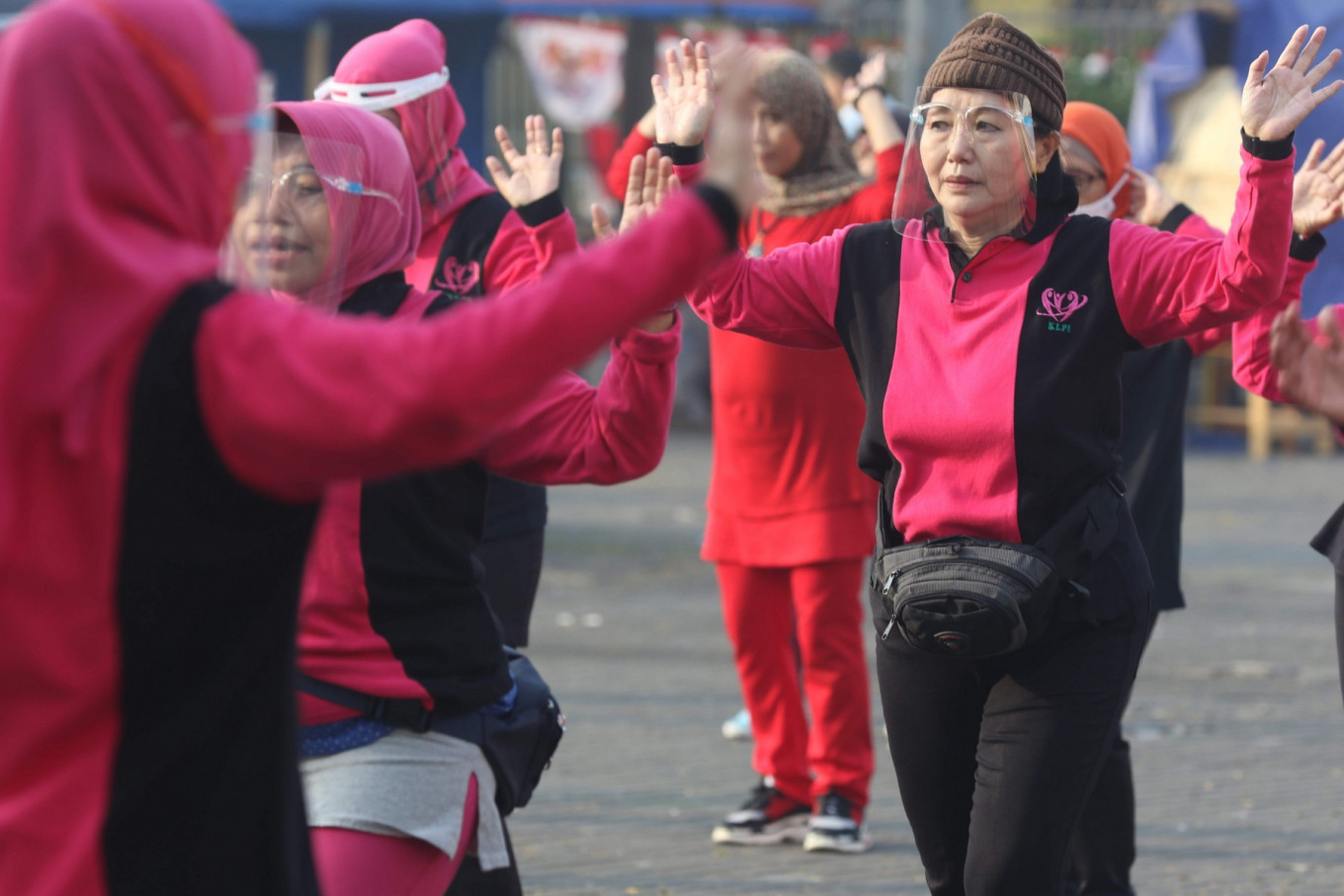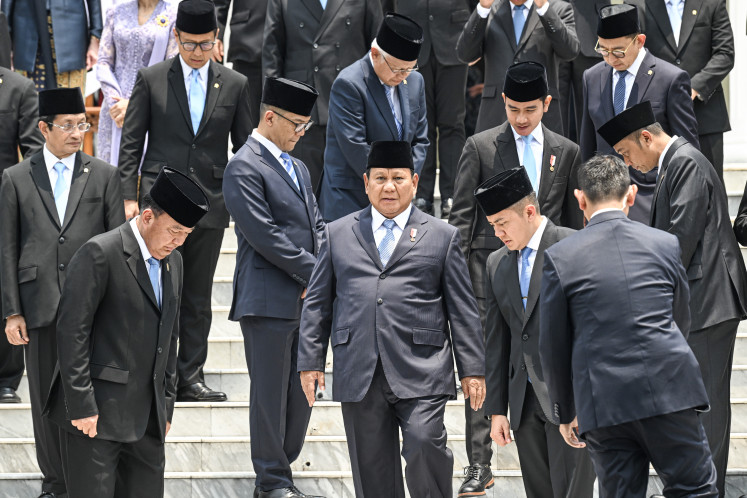Popular Reads
Top Results
Can't find what you're looking for?
View all search resultsPopular Reads
Top Results
Can't find what you're looking for?
View all search resultsTurning 69: the best is yet to come
Most people consider any age greater than 65 to be elderly, but for me, this is laughable, as I don’t look, feel, sound or behave elderly.
Change text size
Gift Premium Articles
to Anyone
If sex were a number, some would say it’s 69. Go figure!
1969 was an erotic year for Serge Gainsbourg, legendary French singer-songwriter, and his British romantic and creative partner Jane Birkin, who died last Sunday, July 16. They celebrated it in their 1969 song “L’Annee Erotique”.
69 also resembles the yin-yang symbol as well as the glyph for Cancer, my zodiac sign. For me, July 19 marked the beginning of my 69th year on this earth. Ta da!
Most people think any age greater than 65 is elderly, but for me, this is laughable, as I don’t look, feel, sound or behave elderly.
And I am far from unique. There are many 60, 70, 80 and even 90-year-olds who are still youthful and vibrant, like Helen Mirren, 75, Jane Fonda, 85 and Rita Moreno, who at 91, is experiencing a career renaissance.
Like Moreno, I love being older. There are many advantages that come with age, and I don’t mean getting a free bus pass on TransJakarta, but being free of the hang ups, insecurities, self-doubts, jealousies, anger and other negative emotions I had when I was younger. I am also more understanding, tolerant, forgiving, happy and wise, and have gained much better insight into myself and others.
Over the past 5 years, I have been doing an extended life review. I have had so many “aha” moments, which helped me understand certain events, including very painful and difficult ones like betrayals by loved ones and those closest to me, which however have contributed to my development, maturity and wisdom, and have liberated me from the prison of the past.
About two years ago, I came across the work of Dr. Gabor Maté, a 79-year-old Canadian physician and author, who specializes in trauma and addiction. He’s not reticent about revealing his own trauma and how his experience as a Hungarian Jewish infant during World War II affected him until he was in his 70s. When Germany occupied Hungary, his mother gave him to a stranger in order to save him. Gabor felt he was being abandoned because as an infant, he was unable to contextualize his mother’s actions.
This trauma pushed him to become a doctor, so that he would be needed. He also became a workaholic, neglecting his own family in the process. However, his early childhood trauma resulted in an underlying anger easily triggered by events that Gabor perceived to be like his infant “abandonment”. When his wife was late to pick him up at the airport, he took a taxi home but didn’t speak to her for two days. Her tardiness had triggered the trauma he experienced over 70 years ago. Imagine.
Gabor’s accounts and insights provided me with a catalyst for understanding my own childhood traumas. My mother didn’t pick me up when I cried because my father would say, “She will stop crying by herself!”. My mother’s need to obey my father overrode her maternal instinct to love and protect me.
Jump to age six when my brother was born, there was a clear shift in my parents’ attention to him. This led to my birth as a feminist. I vowed then I would prove I could be better than their precious son. Like Gabor, I became a workaholic, as well as a “help-aholic” and people pleaser, always putting others ahead of myself. Ironically, feminists are considered selfish, no?
On May 29 of this year, I was diagnosed with myalgic encephalomyelitis/chronic fatigue syndrome (ME/CFS), “a disease characterized by profound fatigue, sleep abnormalities, pain and other symptoms that are made worse by exertion…It often leads to a high degree of physical disability. Some 17-24 million people are affected by ME/CFS worldwide, with women affected more often than men”. No wonder Caitlynn Flynn, an award-winning journalist, wrote the article “Why Chronic Fatigue Syndrome is a Feminist Issue” (SheKnows, 2018).
Despite the large number of people affected by it, it is not a well-known illness to the general public or to the medical profession. In fact, a 2022 Deutsche Welle documentary called it “a mysterious disease”. There are probably many more ME/CFS patients, undetected, undiagnosed or misdiagnosed as long COVID or some other condition.
My ME/CFS was triggered by the frustration, fatigue and stress I experienced working for 15 months at an NGO and “think-tank” - more tank than think! Set up in 1971, they were well known for their critical stance toward the New Order regime. But they had one egregious shortcoming: no gender perspective in their programs and no women in top management.
It seems I was roped in under false pretenses, as I was never given any meaningful support. I was the organizational equivalent of a trophy wife, like my mother was to my father. My attempts to adjust were in vain, as this NGO was patriarchal to the core, and their openness to feminism was as impenetrable as Fort Knox.
For a long time, I tried to understand what my time with them meant. It was only after I got diagnosed with ME/CFS that I figured it out. They represent the patriarchal figure that my parents embodied. I felt the same need to prove myself to the NGO as I did to my patriarchal parents.
Even if I died tomorrow, I would have already left a legacy, so do I really need to prove myself? But somewhere inside of me, the six-year-old Julia still feels that she does.
Gabor wrote a book called When the Body Says No: The Cost of Hidden Stress, in which he explains how when you can’t say no, your body will, in the form of a disease.
For this reason, I am happy to have this illness, as it is saving me from myself. It’s forcing me to stop, and not drive myself into the ground for a patriarchal system that doesn’t give a fig about me. Having ME/CFS gives me an opportunity to take care of myself, to heal, to say no to non-stop external demands, to prioritize my well-being and to achieve a balance that allows me to still serve others, but not by jeopardizing my own health or interests.
Why should you care about my chronic fatigue syndrome? Because many of you are me, and the organization that triggered my illness is a microcosm of the world we live in.
Another book Gabor wrote is The Myth of Normal: Trauma, Illness, and Healing in a Toxic Culture, which aptly describes our world, where governments don’t work for the people’s interests, where big pharma and the medical profession prioritize profits over people’s health, as do corporations who exploit people and the environment, where the defense budget is greater than the budget for health or education and where corruption is considered normal.
“Things have to get worse before they get better”. Even if you believe that, given the state of the world, it’s easy to get discouraged.
While there is no medical cure for ME/CFS, I do not doubt that I will recover, that the best is yet to come and that I will thrive, not just survive, in my seventh decade.
I believe that my current disease is a metaphor for the state of world, and that somehow people will come together and fight against the toxic, destructive global system, and that the best is yet to come, for us all.
***
The writer is the author of Julia’s Jihad.










